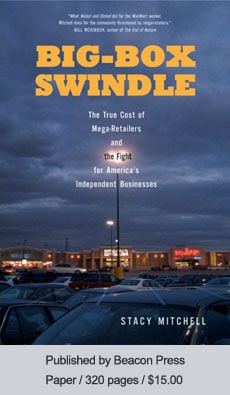The book Big Box Swindle:The True Cost of Mega-Retailers and the Fight for America’s Independent Businesses raises important questions and suggests some interesting ideas that should be of interest to work at home entrepreneurs who struggle to overcome the “Big Boys'” economies of scale.
The main argument against the “Big Box” and it’s “low low prices” is that while the cost at the cash register may seem low, there are a host of “unseen costs” associated with that low price.
For instance, we immediately recognize that if someone offers to sell us gasoline for $1 per gallon when the prevailing rate is about $3 per gallon everywhere else across the whole nation that “something’s wrong”. One gas station ran a 7 cent per gallon sale as a marketing gimmick with the price per gallon subsidized by an advertiser.
Big Box Swindle contends that the “Big Box” stores offer lower prices through subsidies not ordinarily available to the small local businesses that they drive out of business.
Part of their power is in being able to spread their costs nationwide so when local small business was fearful, for instance, of what “Obamacare” would do to their employee payroll costs, Wal Mart could support the legislation knowing that they could accommodate it and that it would keep other competitors from seizing part of their marketshare.
An example of subsidies that enable Big Boxes to compete against local chains are, for instance, state tax loopholes that give chain stores tax advantages your sole proprietorship doesn’t have (p. x). One chain alone had received a BILLION dollars in tax subsidies from the public till because politicians “think” (yes I recognize that’s usually an oxmoron) that “Big Boxes” are better for the business environment than your little store (p. xi). I call that the “Photo Op Theory of Economic Development” . Â In this case, your tax money plus a Big Box getting a hand out = their photo op. Â I’ll bet you could charge less too if the tax payers were paying your rent/mortgage!
You’ll have to read the rest of the book for other illustrations of how politicians fund the Big Boxes, by policy and then are held hostage to their every whim for fear of losing tax dollars but you see the point:Â You could sell things for less too if, using the example above, someone paid all of your mortgage or rent.
One legitimate way that “Big Boxes” sell at  lower prices is that they can buy in volume.
And, honestly, that’s something most small local businesses won’t be  able to do no matter how hard they try.
So what’s a possible solution to that?
Of course there are “buy local” campaigns that do work. But in tough economic times, people still want to watch their money. At some point they may not like the Big Box store, but they won’t pay double.
How can local retailers possibly begin to achieve some economies of scale and “fight back”.
Here’s one option, Community Owned Stores. A community could create its own “Department Store” as a local community corporation (NOT run by the government, but not opposed by local politicians and their policies either!) Local people own the stock, take the profits, and have the ability to buy in greater quantity.
A series of Community Owned Stores in a state or region could even create buying units for lower costs and savings on distribution.
While we’re at it, why couldn’t non-competing local businesses have partnership relationships with the community store that allow them to make purchases through the store’s purchasing system.
That means your work at home business could be a partner and buy office supplies through the community owned store?
A whole series of money saving “economies of scale” open up that would allow businesses to partner together in a  community to reduce overhead and increase profitability while offering the citizenry competitive prices. At the end of the day, though, all the profits would remain in the community, not shipped out to a corporate headquarters somewhere…
